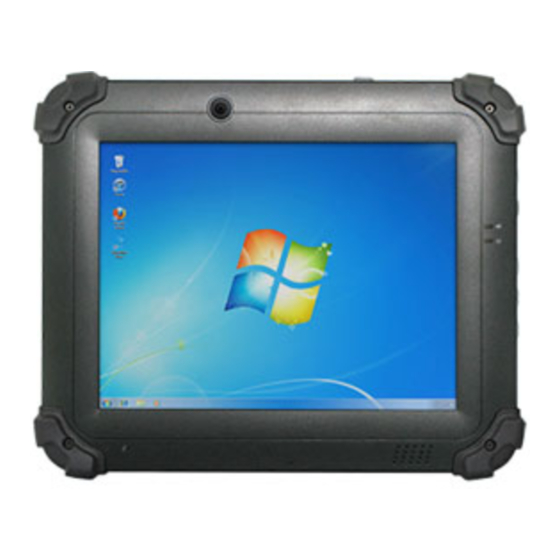- ページ 3
タブレット DT Research DT398HのPDF 基本操作マニュアルをオンラインで閲覧またはダウンロードできます。DT Research DT398H 4 ページ。 Mobile tablet
DT Research DT398H にも: 基本操作マニュアル (9 ページ)

DT398B/ DT398H/ DT398B-MD/ DT398B-MD-C
Power/Battery LED Status:
•
Blue indicates the battery is 25% to 100% charged
•
Blinking blue indicates the battery is charging
•
Orange indicates that the battery is between 11% to 25%
•
Blinking orange indicates that the battery is below 10%
•
Blinking blue and orange alternately indicates the battery is being warmed up. Do not
unplug the AC/DC adapter.
Precautions
•
Always exercise care when operating and handling the
•
Do NOT apply excessive pressure to the display screen.
•
We recommend using the Stylus provided to keep the screen clean.
•
Avoid prolonged exposure of the display panel to any strong heat source. Wherever
possible, the Tablet should face away from direct light to reduce glare.
•
If the AC-DC power adapter is used to recharge or power the
AC-DC adapter other than the one provided with the tablet or acquired from the
manufacturer or its partners.
•
In the unlikely event that smoke, abnormal noise, or strange odor is present,
immediately power off the Tablet and disconnect all power sources. Report the
problem to your device provider immediately.
•
Never attempt to disassemble the
Basic Features
The Tablet wireless tablet integrates a bright and responsive touch display, 1 USB
port, and embedded networking elements such as Wi-Fi or optional 3G. The Tablet is
complemented by a suite of accessories, including battery expansion, docking cradles,
and wall/ vehicle mount cradles, for a comprehensive user experience.
A Tablet typically integrates an 802.11 Wi-Fi adapter that may connect to other wireless
devices or access points. If your Tablet does not come with such a network adapter,
please consult your device provider to establish the desired network connectivity.
4
ENGLISH
Tablet.
tablet, do NOT use any
Tablet, as this will void the warranty.
OPERATION
Internal Battery
Warning!
!
The Internal battery pack should only be replaced by an authorized DT Research service
representative. Please contact your product and/or service provider for internal battery
replacement service.
Powering ON and OFF
To activate the Tablet, push and quickly release the Power Button. The display will come
on in a few seconds. To put the Tablet in Standby mode, push and quickly release the
Power Button. To turn the Tablet off for extended storage, power off safely using any
software function that "shuts down computer" provided in the software operating
system.
NOTE: The battery packs shipped with your tablet may be low in power—please use
the AC-DC adapter with the Tablet when setting up for the first time to fully charge the
internal battery pack. You may charge the external battery pack with it attached to the
Tablet, or with the optional external battery charger kit.
NOTE: When the battery pack(s) is (are) charging, the blue-colored Battery LED should
blink slowly. If plugging in the AC-DC adapter does not trigger this blinking activity and the
LED stays dark, the battery pack(s) may have been drained substantially. Try unplugging/
replugging the AC-DC adapter to the Tablet a few times to activate the charging process.
NOTE: To conserve power, use (push and quick release) the Power Button to put in
"Standby" mode while not in use. Pushing briefly on the same button will wake up the
system within seconds.
NOTE: Avoid using the Power Button ("hold 4+ seconds" feature) to turn off the tablet—
this form of hardware shutdown is intended to be a means of recovery from lockups, and
not as normal operation.
Start Up
If the power up (from Standby or otherwise) is successful, the appropriate interface will
be displayed after a launch sequence of several seconds. The wireless LAN connection
may take 10-15 seconds to be established.
Configuring the DT398B/ DT398H/ DT398B-MD/ DT398B-MD-C
The tablet may be configured using the utilities and methods dictated by the software
operating system. The Tablet should be configurable for various properties such as user
profiles, network features, and several system elements.
5
ENGLISH
